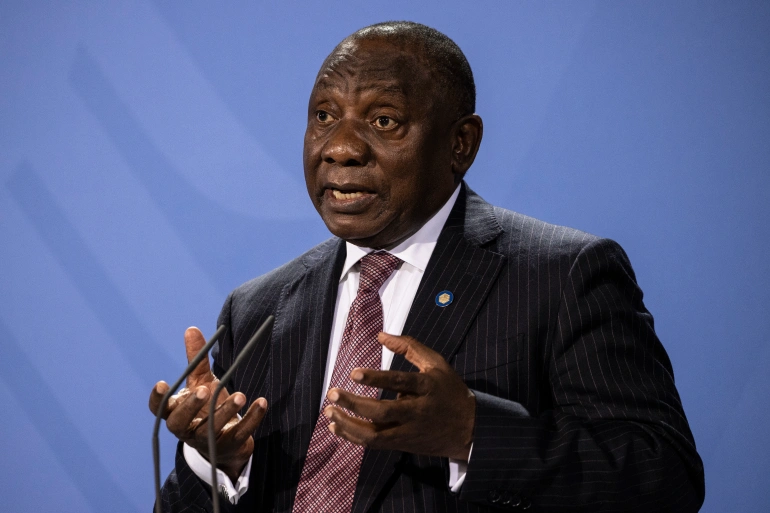President Cyril Ramaphosa of South Africa has urged countries to “immediately” repeal “scientifically unjustified” travel restrictions related to the discovery of a new coronavirus type.
On Sunday, he made his remarks as the highly mutated version, named Omicron, continued to spread over the world, with fresh cases being discovered in the Netherlands, Denmark, and Australia.
Since South African scientists identified the novel variety last week, dozens of countries have placed sanctions on the country and its neighbours. Omicron has been identified by the World Health Organization (WHO) as a “variant of concern” that is potentially more contagious than prior versions.
“We call upon all those countries that have imposed travel bans on our country and our southern African sister countries to immediately and urgently reverse their decisions,” Cyril Ramaphosa said, in his first address to the nation since the detection of Omicron.
“The prohibition of travel is not informed by science,” he added.
“The only thing the prohibition on travel will do is to further damage the economies of the affected countries and undermine their ability to respond to, and recover from the pandemic,” Cyril Ramaphosa added.
“These restrictions are unjustified and unfairly discriminate against our country and our southern African sister countries.”
The sudden cancellation of flights has shaken South Africa’s key tourism economy, with booking cancellations surging immediately after the news. Because of a decline in foreign tourists, the country’s tourism sector lost $10 billion in bookings in 2020 and is expected to lose around $10 million every week flights remain suspended from key international tourist destinations.
“There is a lot of concern around what these travel restrictions will mean [economically] for southern Africa as a region, especially ahead of the holiday period, when thousands of visitors from Europe are expected,” she said. “A lot of anger from the president and the government around the good work, they say, scientists have been doing on genome sequencing and also tracing COVID-19 changes, but instead South Africa being punished.”
Matshidiso Moeti, WHO’s regional director for Africa, praised South Africa for informing the UN’s health agency as soon as its national laboratory identified the Omicron variant, but criticised travel restrictions and urged countries to follow science and international health regulations to avoid such measures.
“Travel restrictions may play a role in slightly reducing the spread of COVID-19 but place a heavy burden on lives and livelihoods,” Moeti said in a statement. “If restrictions are implemented, they should not be unnecessarily invasive or intrusive, and should be scientifically based, according to the International Health Regulations, which is a legally binding instrument of international law recognised by over 190 nations.”
A South African vaccinologist, Shabir Madhi, told that countries “should not imagine they can stop the spread of this type by imposing a blanket embargo on countries in southern Africa.”
“The virus has already found its way into these societies from individuals that haven’t even travelled to or come into contact with anyone from southern Africa,” he said. “In South Africa, we have one of the globe’s best COVID sequencing capacities based on our experience with treating HIV and TB. We have been ahead of the game for a while now and we are thus a victim of our success.”
While scientists are currently determining the virulence of Omicron, the WHO warned on Sunday that it is “not yet apparent” if the variant spreads more easily from person to person or causes more severe disease than other strains.
“There is currently no information to suggest that symptoms associated with Omicron are different from those from other variants,” the agency said.
While preliminary research suggests that patients who have previously been infected with COVID-19 are more likely to become infected with Omicron, information is still scarce.
The WHO stated that PCR tests are still detecting Omicron infection and that it is attempting to determine the potential impact of the variation on existing countermeasures, such as vaccines.
In his speech, Ramaphosa called the vaccine the “most potent tool” for limiting its spread and urged South Africans to be vaccinated.
In order to boost vaccination rates, he said the government was considering making vaccines mandatory for particular activities and venues.
Due to a sluggish start to its vaccine programme and widespread hesitation, only around 35% of adults in South Africa have been properly immunised.
With 2.9 million infections and 89,797 deaths confirmed to date, the country is Africa’s worst affected by the virus.
Omicron is thought to be causing an increase in infections, with 1,600 new cases reported on average over the last seven days, up from 500 the week before.
